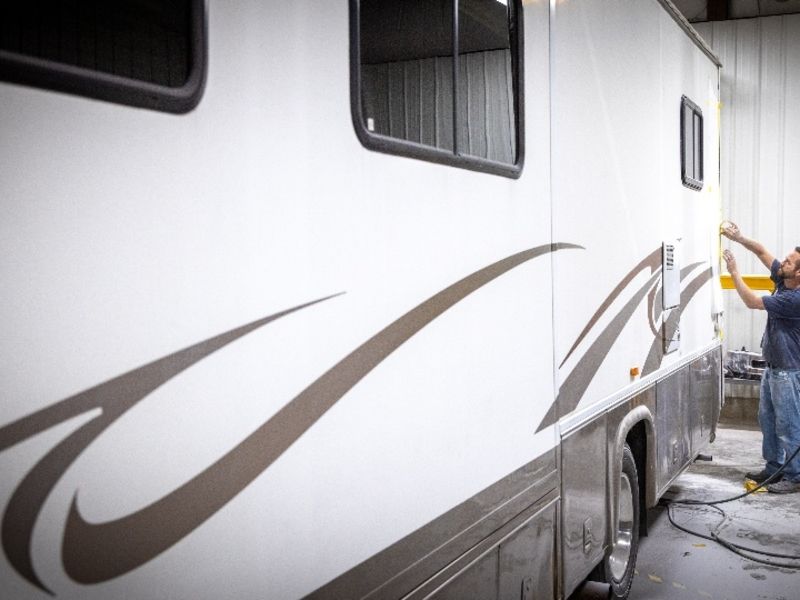
The idea came to Kevin Telfor a few years ago in the middle of a campground as he watched a fellow camper struggle to back an RV into its parking space. Later, he struck up a conversation with the driver.
“I said to him, ‘I’ve never worked on RVs, but if you ever need something, I’ll give you my card,’ ” said Telfor, the body shop manager at Krapohl Ford & Lincoln in Mount Pleasant, Mich.
A few months later, the camper called. Ever since, Telfor and the body shop have developed a knack for fixing RVs, fifth-wheel trailers, motor homes and any other kind of vehicle they could fit into their bays. Pursuit of repair jobs beyond traditional passenger vehicles has become a hallmark of the dealership.
Among unconventional vehicles, none has brought in more business than RVs — and that was before a national boom in RV travel fueled by the pandemic. Now that more Americans are taking road trips, Krapohl’s yearslong effort to hone an expertise in RV services is paying off.
“We’ve had a couple years doing it before the virus hit,” Telfor told Automotive News. “And, yes, because of COVID, people are getting out more. When [accidents] happen, and they do, they’re here. For us, it’s falling into place. I see the sky is the limit here, and we’re going to keep reaching higher.”
Demand for RVs has sharply increased in recent months — jumping 35 percent year over year in September, continuing a summer climb that experts say is ongoing. Despite a two-month industrywide shutdown this spring to limit spread of the coronavirus, 2020 shipments through September are down only 3.2 percent, according to the RV Industry Association.
“We do not see the demand for RVs going down anytime soon,” said association President Craig Kirby.
For RV owners, finding places that specialize in repairing such vehicles can be arduous. Krapohl says it draws customers from as far as Michigan’s Upper Peninsula, a distance of, at a minimum, 160 miles.
On an October afternoon, four RVs were on-site. Krapohl is mulling an expansion that would add three bays capable of holding RVs and bus-sized vehicles. Roughly 30 percent of the dealership’s body shop revenue comes from RV and fleet repairs, and Telfor expects that percentage may increase to as much as 40 percent of business by next year.
It wasn’t always that way. When Telfor, now 57, took over the body shop seven years ago, the dealership needed to build its repair reputation with a redoubled marketing effort. Part of that involved educating customers that the dealership repaired more than Fords and Lincolns. That’s paid off. On a given day, the waiting list runs two dozen vehicles deep. During Telfor’s tenure, the body shop has added more than a dozen employees. The staff stands at 17, and he’s looking to add two more mechanics.
Another aspect was delving into custom projects. Beyond RVs, Kra-pohl handles boat repairs — often, the dealership gets requests to put spray-in truck bedliners on pontoons. Krapohl also handles restoration projects, such as a 1966 Ford Mustang that received a fresh paint job, an overhauled interior and new convertible top.
“If it’s got a dent or needs paint, we can fix it,” Telfor said. “We’ve been doing it so long, we’re always reaching for something else that’s out there. We’ll take a swing at anything.”
For the past five years, that scope includes ambulances. Krapohl has established a contract with MMR, a medical transportation company that serves 15 counties in central Michigan, to care for its fleet of ambulances. There usually are two or three undergoing maintenance at a given time, Telfor says, and the staff takes special pride in sending them back with a finish as gleaming as that of a fire truck.
If the unconventional expansion was a major external focus, Telfor says an internal effort has also paid off. When he arrived, he instituted a standing 8 a.m. meeting for all technicians at which the entire staff is quickly apprised of the status of two dozen or so repairs in progress.
“From the wash guy to the guy working on the fleet, everyone knows where everyone stands,” he said. “Nobody can say, ‘I don’t know.’ It’s just good communication, and I want everyone to go home feeling good about a good day’s work. That’s the atmosphere I want. We had a new guy start a few weeks ago, and I told him, ‘Let anyone know if you need anything. There isn’t anybody in this shop who wouldn’t drop everything to give you a hand.’ ”